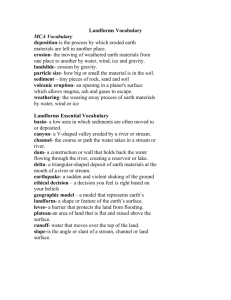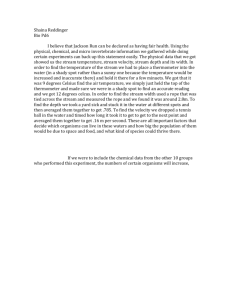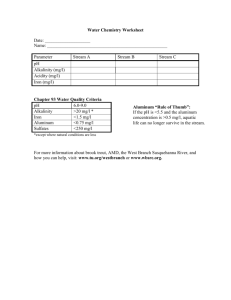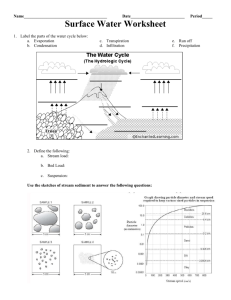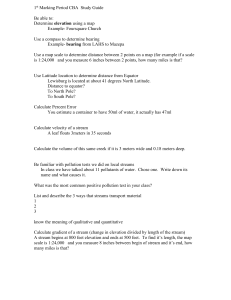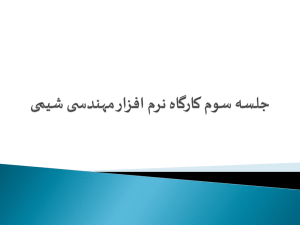I/O streams
advertisement
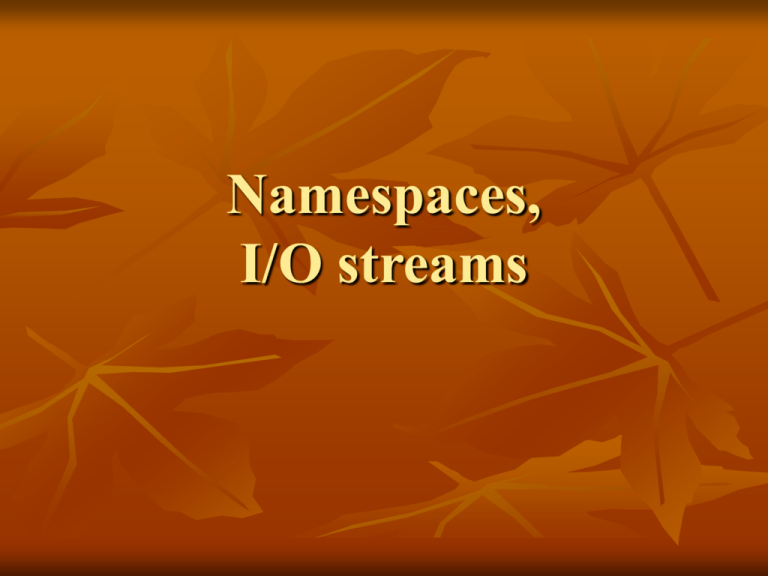
Namespaces,
I/O streams
Namespaces
Namespace – what’s this?
namespace
When do we need the namespace?
Namespaces – using
namespace mine
{
void printf(int);
class file;
void fprintf(const file &, int);
}
mine::printf(44);
mine::file infile;
fprintf(infile, 31415323); // if at least one function argument comes from
// the „mine” namespace, then the function
// fprintf() is looked for in this namespace first
// (Koenig search rule)
Namespaces – using
Namespaces may be extended/joined
Any given name (or all the names) may be moved from
namespace scope to the global (or local) scope
in a single source file
in many files
using mine::file;
using namespace mine;
Avoid using „using” in the header files!
why?
use the scope operator instead.
Namespace std
The C++ standard library is defined in the std
namespace.
stream classes
string classes
STL
headers „with .h” and „without .h”
interesting fact: „*.hpp” and „*.hxx” are considered
obsolete and non-standard
Standard C++ I/O streams
IOStream library (iostream)
it’s the oldest part of the standard library
developed by AT&T
support for internationalization
string types supported by library
char * (compatibility with earlier routines)
string
iostream is a library of templates,
iostream uses exception mechanism
IOStream library – basics
classes
input stream istream (from template:
basic_istream<char>)
output stream ostream (from template:
basic_ostream<char>)
IOStream library – basics
objects (header file: <iostream>)
istream cin;
//stdin , buffered
ostream cout;
ostream cerr;
ostream clog;
//stdout, buffered
//stderr, not buffered
//by default outputs to console
//no C equivalent, buffered
//by default outputs to console
IOStream library – basics
operators << and >>
overloaded for fundamental types, including char *, void *, bool,
to be overloaded for classes requiring stream i/o
istream is;
ostream os;
int i; double d;
os<<i;
is>>i;
os<<d;
is>>d;
os<<i<<d;
is>>i>>d;
cout<<i<<d;
cin>>i>>d;
cout<< "\ni is " << i << " and d is " << d << " \n";
IOStream library – basics
Manipulators
this are objects used to modify default behaviour of a stream (e.g.
formatting), output „end of line” etc.
programmer may define his own operators
endl
//outputs end of line and flushes the stream buffer
cout<< "\ni is " << i << " and d is " << d << endl;
ends
// "\0";
ws
// for istream stream read (and skip) white spaces
flush
dec, hex, oct
IOStream library – details
ios_base
basic_streambuf<>
basic_ios<>
virtual
basic_istream<> basic_ostream<>
basic_iostream<>
IOStream library – details
ios_base
common interface for stream classes
independent on the class/type of the stream
elements
current condition of the stream
formatting of the data being processed
IOStream library – details
basic_ios<>
common interface for stream classes in extent
dependent on the class/type of the stream
elements
definition of the stream buffer (class derived from
template basic_streambuf<> for specific class/type
of the stream element, definitions of methods
actually reading/writting data)
IOStream library – details
basic_istream<>
basic_ostream<>
templates for classes of read-only/write-only
streams
they inherit virtually template basic_ios<>
for the char template argument they’re derived
from istream i ostream respectively
headers: <istream> and <ostream>
IOStream library – details
basic_iostream<>
templates of stream classes capable of reading
and writting
header <istream>
IOStream library – details
result of stream operations
status of the stream (within scope of ios_base,
constants of type iostate)
goodbit
eofbit
failbit
badbit
// everything ok
// bits described below are zeroes
// end of file reached
// last operation failed
// following operations will fail
// until failbit gets set to 0
// failure; stream destroyed
IOStream library – details
result of stream operations - methods
bool good() // everything ok
bool eof() // end of file reached
bool fail() // last operation failed
bool bad() // failure; stream destroyed
rdstate()
// read the stream state
clear()
// set the state to goodbit
clear(state) // set state to state
setstate(state)
//equivalent of
// clear(rdstate() | state)
IOStream library – details
result of stream operations – conversion operators
operator void* ()
// equivalent of !fail()
if (cin>>x) // or: while(cin>>x)
{ // x read without an error
}
operator ! ()
// equivalent of fail()
if ( !!(cin>>x)) // or: while( !!(cin>>x))
{ // x read without an error
}
IOStream library – details
result of stream operations – exceptions
to define when to throw exceptions (method of stream
class):
exceptions(flags)
to check what may cause throwing exceptions (method of
stream class):
exceptions()
if it returns goodbit, then exceptions are never thrown
IOStream library – details
i/o – formatted and unformatted
operators << and >> by default do formatted i/o
(specific precision, skipping white spaces etc.)
methods get*/put*/read*/write* etc. are for
unformatted i/o only
IOStream library – details
formatted i/o
methods for format flags (ios::fmtflags)
setf(flags);
setiosflags(flags);
setf(flags, mask);
resetiosflags(mask);
unsetf(flags);
flags();
flags(flags);
copyfmt(stream)
// set flags
// equivalent to setf(flags);
// set flags within the mask group only
// equivalent to setiosflags(0, mask);
// clear flags
// retrn flags currently set
// set flags, clear all the remaining
// copy flags from stream
IOStream library – details
formatted i/o
flags and masks
boolalpha
adjustfield
left
right
internal
// flag: type bool numeric (0/1) or descriptive
// true/false
// there are also manipulators: boolalpha and noboolalpha
// mask: alignment (left, right, internal)
// flag: align to left
// flag: align to right
// flag: for digits align sign to left
// remaining characters to right
// there are also manipulators: left, right and internal
IOStream library – details
formatted i/o
flags and masks
showpos
// output „+” for positive numbers
// there are also manipulators: showpos and noshowpos
uppercase
// print (upper case) hexadecimal digits
// there are also manipulators: uppercase and nouppercase
basefield
dec, hex oct
(empty)
// mask: for bases of numerical system (see below)
// flags for different numerical systems
// flag: output as dec, input according to
// actual prefix 0x – hex, 0 – oct, else: dec
// there are also manipulators: dec hex and oct
IOStream library – details
formatted i/o
flags and masks
showbase
// precede numbers with prefix of numerical system
// there are also manipulators: showbase and noshowbase
floatfield
// mask: format of the floating point
fixed
// decimal fraction (eg. 3.14159265323)
scientific
// use exponent (eg. 3.14e+0)
(empty)
// pick best one depending on value being oputput
// there are also manipulators: fixed and scientific
showpoint
.
// always output the dot (3 1415)
// for the floating point
// there are also manipulators: showpoint and noshowpoint
IOStream library – details
formatted i/o
precision() // return the precision
// for the floating point,
// by default 6 digits after dot
precision(p) // return the precision
// for the floating point
// there is also manipulator: setprecision(w)
IOStream library – details
formatted i/o
flags
skipws
// skip white spaces
// there are also manipulators: skipws and noskipws
unitbuf
// flush the output buffer
// after each <<
// there are also manipulators: unitbuf and nounitbuf
IOStream library – details
formatted i/o
width()
// return width of the filed (number of characters)
// interpreted as: not less than
width(w)
// set the width of the filed (number of characters)
// interpreted as: not less than
// there is also manipulator: setw(w)
char buf[80];
cin >> setw(sizeof(buffer)) >> buffer;
fill()
fill(c)
// return character that is used for filling the field
// set this character
// there is also manipulator: setfill(c)
IOStream library – details
formatted i/o
methods for internationalization, different
character sets, etc.
described in detail in the library reference ;-)
IOStream library – details
unformatted i/o
method get
int get();
// read one character, or EOF
// equivalent to getchar()/getc()
istream& get(char &c); // no EOF, instead test the stream state
istream& get(char *pc, streamsize cnt)
istream& get(char *pc, streamsize cnt, char delim)
// read to pc buffer, stop after having read
// cnt-1 characters, or after (just before) the delim character
// do not input delim, append ‘\0’
istream& ignore(streamsize cnt, char delim)
// couple variants, read, but do not store
IOStream library – details
unformatted i/o
method getline
istream& getline(char *pc, streamsize cnt)
istream& getline(char *pc, streamsize cnt, char delim)
// read to pc buffer, stop after having read
// cnt-1 characters, or after (just before) the delim
// or after reading end of line
// delim is being read from the stream
// if number of read characters is less than cnt
// then set failbit state
IOStream library – details
unformatted i/o
methods read and readsome – some aspects
istream& read(char *pc, streamsize cnt)
// read cnt characters
streamsize readsome(char *pc, streamsize cnt)
// return number of characters read,
// read no more than cnt-1 characters
// input only the characters, that already are
// in the input buffer (not destructive)
IOStream library – details
unformatted i/o
int peek(char *pc, streamsize cnt)
// read next character, leave it in the buffer
istream& unget()
// return to the stream one most recently read character
// depending on the implementation, you may call it
// 1 or more times in a row
// if it fails than set badbit
istream& putback(char c)
// as above, but if c is not the most recently read character
// then set badbit
IOStream library – details
unformatted i/o
ostream& put(char c)
// output c to the stream
ostream& write(const char *pc, streamsize cnt)
// output cnt characters from pc to the stream
// do not append the \0
ostream& flush()
IOStream library – basics
File stream classes
input stream ifstream (derived from template:
basic_ifstream<char> /derived from
basic_istream<char> /)
output stream ofstream (derived from template:
basic_ofstream<char> / derived from
basic_ostream<char> /)
i/o stream fstream (derived from template:
basic_fstream<char> / derived from
basic_iostream<char> /)
IOStream library – basics
int i;
ifstream infile(„file.txt”);
if (! infile)
cout<<„file not opened”;
else
infile >>i;
IOStream library – basics
Flags for file streams (from the scope std::ios)
constructor arguments: fstream(name, flags=def)
in
// flag : input stream, default for ifstream
out // flag : output stream, default for ofstream
app // flag : for input stream, set the position to end of file
ate
// flag : set the position to end of file
trunc // flag : remove the file contents (if not already empty)
binary // flag : binary mode (do not interpret CR LF)
ifstream ibin(„data.bin”, std::ios::in | std::ios::binary);
IOStream library – basics
Methods for file streams
open
close
is_open
tellg/tellp
seekg/seekp
// ( file_name [, flags] )
// ()
// is the file opened?
// get actual reading/writting(p) position (offset)
// seek for reading/writting
// overloaded variants: relative/absolute position
ifstream ibin(„data.bin”, std::ios::in | std::ios::binary);
IOStream library – details
Details on file stream classes
described in detail in the library reference ;-)
IOStream library – basics
Classes for memory streams (string streams)
input stream istringstream (derived from template:
basic_istringstream<char> /derived from
basic_istream<char> /)
output stream ostringstream (derived from
template: basic_ostringstream<char> / derived
from basic_ostream<char> /)
i/o stream stringstream (derived from template:
basic_stringstream<char> / derived from
basic_iostream<char> /)
IOStream library – details
Details on memory stream classes
described in detail in the library reference ;-)
